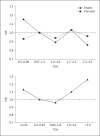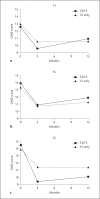Hypothyroidism and depression
- PMID: 24847450
- PMCID: PMC4017747
- DOI: 10.1159/000353777
Hypothyroidism and depression
Abstract
Background: A relationship between hypothyroidism and depression has been assumed for many years; however, the true nature of this association has been difficult to define with many conflicting studies. In recent years, our knowledge in this area has increased significantly with large cohort studies and genetically driven studies being published.
Objectives: We reviewed the literature on thyroid function and depression to determine if this relationship has been clarified.
Methods: We performed a search on the Pubmed database using the terms 'thyroid ' and 'mental health ', 'depression ' and 'well-being '.
Results: Large epidemiological studies generally suggest no association between thyroid function and depression in subjects without thyroid disease. Subjects on thyroxine have poorer psychological well-being than subjects with no thyroid disease even if biochemically euthyroid, they also show an association between thyroid function and well-being. Whilst there is some early evidence that genetic factors can influence well-being on thyroxine and response to combination therapy, there is also evidence to suggest that much morbidity on thyroxine may be due to initial misdiagnosis and mis-attribution of symptoms.
Conclusion: Despite the large number of studies, the relationship between thyroid function and depression remains poorly defined. Clarification of the proportion of subjects on thyroxine incorrectly may assist the large (perhaps genetically driven) studies needed to move forward in this area, as it is expected that they cloud the results.
Keywords: Depression; Hypothyroidism; Thyroid; Thyroxine.
Figures




References
-
- Hetzel BS, Chavadej J, Potter BJ. The brain in iodine deficiency. Neuropathol Appl Neurobiol. 1988;14:93–104. - PubMed
-
- Chaouki ML, Maoui R, Benmiloud M. Comparative study of neurological and myxoedematous cretinism associated with severe iodine deficiency. Clin Endocrinol (Oxf) 1988;28:399–408. - PubMed
-
- Friesema EC, Grueters A, Biebermann H, Krude H, von Moers A, Reeser M, Barrett TG, Mancilla EE, Svensson J, Kester MH, Kuiper GG, Balkassmi S, Uitterlinden AG, Koehrle J, Rodien P, Halestrap AP, Visser TJ. Association between mutations in a thyroid hormone transporter and severe X-linked psychomotor retardation. Lancet. 2004;364:1435–1437. - PubMed
-
- LaFranchi S. Congenital hypothyroidism: etiologies, diagnosis, and management. Thyroid. 1999;9:735–740. - PubMed
Publication types
LinkOut - more resources
Full Text Sources
Other Literature Sources

